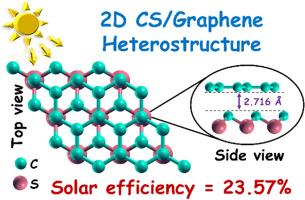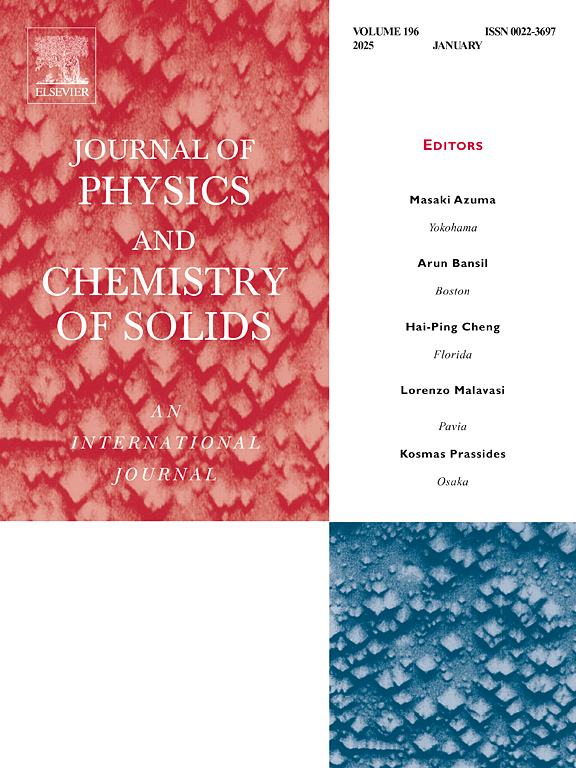用于可持续能量收集的碳单质/石墨烯范德华异质结构
IF 4.3
3区 材料科学
Q2 CHEMISTRY, MULTIDISCIPLINARY
引用次数: 0
摘要
我们将石墨烯(G)堆叠在碳基单质(CX;X = S、Se 和 Te)单层上,以两种不同的模式(I 和 II)构建了范德华(vdW)异质结构,并通过第一原理计算预测了各种物理性质。在这六种异质结构中,有三种体系(模式 I 和 II 中的 CS/G,以及模式 II 中的 CSe/G)最为稳定。此外,计算得出的电子特性证实,图案 II 中的 CS/G 和 CSe/G 异质结构是间接半导体,其窄带隙值分别为 0.49 和 0.30 eV。值得注意的是,这两种异质结构(CS/G 和 CSe/G)在室温下的电子载流子迁移率分别为 762.83 和 206.84 m2/Vs,明显高于其他异质结构。此外,两种异质结构中的本征和界面偶极子都沿着 +z 轴排列,从而增强了界面上的电荷转移,缩小了带隙,尤其是在 CSe/G 中。这种极化效应有助于观察到高电子迁移率和热电性能。利用 BoltzTrap 代码中的玻尔兹曼输运理论预测了塞贝克系数、电导率和热电功率因数等电子输运系数。在 300K 温度下,CSe/G 异质结构的最高功率因数达到 249 mW/mK2,证明了其具有良好的热电功能。此外,计算得出的光学特性显示,CS/G 异质结构具有作为光吸收体的潜力,其太阳能光能转换效率(η)为 23.57%,可用于太阳能电池装置。我们的预测表明,新型二维 CX/G vdW 异质结构有可能成为设计新型太阳能和热能收集器件的理想候选材料。本文章由计算机程序翻译,如有差异,请以英文原文为准。

Carbon monochalcogenides/graphene van der Waals heterostructures for sustainable energy harvesting
We constructed the van der Waals (vdW) heterostructures by stacking graphene (G) on top of carbon-based monochalcogenides (CX; X = S, Se, and Te) monolayer in two different patterns (I and II) and predicted various physical properties through first-principles calculations. Among the six heterostructures, three systems (CS/G in Pattern-I and II, and CSe/G in Pattern-II) were found to be most stable. Additionally, the calculated electronic properties confirmed that the CS/G and CSe/G heterostructures in Pattern II are indirect semiconductors with narrow band gap values of 0.49 and 0.30 eV, respectively. Notably, both heterostructures (CS/G and CSe/G) exhibit significantly larger electron carrier mobilities of 762.83 and 206.84 at room temperature, respectively. Furthermore, intrinsic and interface dipoles in both heterostructures were found to align along the +z axis, enhancing charge transfer at the interface and narrowing the band gap, particularly in CSe/G. This polarization effect contributes to the observed high electron mobility and thermoelectric performance. Electronic transport coefficients like the Seebeck coefficient, electrical conductivity, and thermoelectric power factor are predicted using the Boltzmann transport theory implemented in the BoltzTrap code. The highest power factor was achieved for the CSe/G heterostructure at , demonstrating its ability for good thermoelectric purposes. Besides, the computed optical properties revealed the potential of the CS/G heterostructure as a light absorber with an excellent solar light energy conversion efficiency of 23.57 % for solar cell device applications. Our predictions show that the novel 2D CX/G vdW heterostructures could be promising candidates for designing new solar and heat energy harvesting devices.
求助全文
通过发布文献求助,成功后即可免费获取论文全文。
去求助
来源期刊
CiteScore
7.80
自引率
2.50%
发文量
605
审稿时长
40 days
期刊介绍:
The Journal of Physics and Chemistry of Solids is a well-established international medium for publication of archival research in condensed matter and materials sciences. Areas of interest broadly include experimental and theoretical research on electronic, magnetic, spectroscopic and structural properties as well as the statistical mechanics and thermodynamics of materials. The focus is on gaining physical and chemical insight into the properties and potential applications of condensed matter systems.
Within the broad scope of the journal, beyond regular contributions, the editors have identified submissions in the following areas of physics and chemistry of solids to be of special current interest to the journal:
Low-dimensional systems
Exotic states of quantum electron matter including topological phases
Energy conversion and storage
Interfaces, nanoparticles and catalysts.

 求助内容:
求助内容: 应助结果提醒方式:
应助结果提醒方式:


